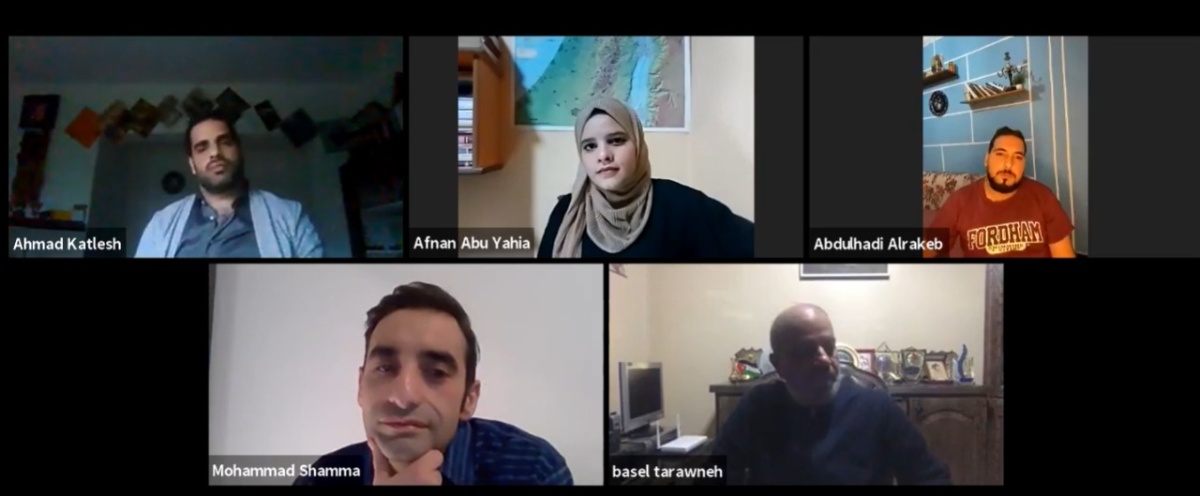At the launch by Arab Renaissance for Democracy and Development’s (ARDD) of its youth platform “Huna Sotak… Sawt Al Nahda”, young journalists stressed the role of social journalism in giving youth and the most marginalized groups the opportunity to make their voices heard.
During an online session titled “Social journalism beyond COVID-19” run by journalist Mohammad Shamma, who has a special interest in human rights, contributing participants — Ahmad Katlesh, Syrian Germany-based writer and journalist, Afnan Abu-Yahia, Jordanian journalist and researcher, and Abdulhadi Al Rukp, Syrian Jordan-based activist and journalist — stressed the importance of upholding social journalism’s professional conduct to ensure that the community receives true knowledge and balanced information.
Besides discussions about the importance of maintaining a professional public discourse, the session also tackled issues like promoting Arab social journalism in response to the COVID-19 crisis and the need for a platform that delivers the voices of Arab youth in their home countries and the diaspora. Noting that raising awareness about the ethics of journalism contributes to true, credible reporting, participants stressed the importance of neutral reporting, of seeking the opinion of true change-makers in the community, of the need for youth to participate in journalism and of social accountability.
Abu-Yahia said that the concept of social journalism is “hard to define”, but it may be said that it is part of journalism dealing with human rights and that it may only successfully carried out in collaboration and coordination with the community.
Katlesh pointed out that when it comes to the representation and delivery of the voices of refugees, Western media narratives present refugees’ achievement as unusual. There is also a need for independent social journalism to represent people and support the delivery of the full truth to counter unreliable or inaccurate information, which sometimes is circulated by some Arab groups on social media in Western countries.
The participants also noted that the defense orders issued in response to the COVID-19 pandemic greatly affected journalism, complicating journalists’ ability to move and limiting freedom of speech, and access to information and provision of breaking news. This may lower people’s trust in journalism, they said.
Al Rukp stressed the role of social journalism in delivering people’s voices during the pandemic and the communities’ thirst for honest social journalism, particularly during the pandemic, when they need to know its ramifications and about the efforts initiated in response to it.
As for the social media effect on journalism, participants noted that while social media may contribute to delivering certain details or information that requires prompt answers from officials, those practicing it need to verify the information they make public, maintain professional journalism, never use hate speech and ensure quality journalism, because only professional pieces sustain the test of time and earn the respect and trust of the public.
Participants also said that media outlets impose limitations on journalists through their editorial policies, and lack “complete transparency”, mostly because of the intervention of different entities and interests in the work of media institutions. They stressed the need for social journalism that broadcasts and presents news from a community’s point of view, brings an added value, and invests in available tools, and concluded by highlighting the fact that it is essential to allow youth to contribute to change, to promote their role in Arab social journalism and to hear their opinion about issues that affect their lives and future.
Huna Sotak was established in 2010 as an online platform by RNW MEDIA. In 2020, RNW MEDIA and ARDD partnered to provide youth with the knowledge and practical skills to practice social journalism, enabling them to make their voices and those of their communities heard, and enhance social solidarity. The website is the fruit of their efforts, with the support of activist journalists.
“Huna Sotak… Sawt Al Nahda” is a component of the ARDD programs concerned with empowering youth, and securing the right to information, freedom of speech and social solidarity. It is a media platform for the youth and a space for learning. ARDD invites passionate and inventive youth in the Arab world and the diaspora to share their ideas, opinions, visions, and their contributions via the website www.hunasotak.com and thus make them and their communities’ voices heard.


